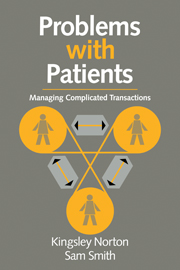Book contents
- Frontmatter
- Contents
- Foreword by Professor Paul Freeling, O.B.E.
- Preface
- Acknowledgments
- 1 Doctor–patient interaction
- 2 The clinical transaction
- 3 Interpersonal influences
- 4 The influence of past relationships
- 5 Contextual influences
- 6 Managing complicated clinical transactions
- 7 Interventions in complicated clinical transactions
- 8 Implications for the clinical setting
- 9 Implications for training
- Appendix I Clinical phenomena related to ‘problem patients’
- Appendix II Personality disorder
- References
- Index
7 - Interventions in complicated clinical transactions
Published online by Cambridge University Press: 19 March 2010
- Frontmatter
- Contents
- Foreword by Professor Paul Freeling, O.B.E.
- Preface
- Acknowledgments
- 1 Doctor–patient interaction
- 2 The clinical transaction
- 3 Interpersonal influences
- 4 The influence of past relationships
- 5 Contextual influences
- 6 Managing complicated clinical transactions
- 7 Interventions in complicated clinical transactions
- 8 Implications for the clinical setting
- 9 Implications for training
- Appendix I Clinical phenomena related to ‘problem patients’
- Appendix II Personality disorder
- References
- Index
Summary
Introduction
In Chapter 6 a methodical approach to analysing complicated transactions was developed. In every case, even where departures are only apparent in the public domain, the doctor's initial response is to examine his or her own feelings and behaviour (i.e. countertransference reaction and systemic influences). This initial step is taken in recognition of the fact that any action a doctor takes within a transaction is susceptible to influences other than those of the strictly clinical requirements of the transaction. As discussed in earlier chapters, public and personal levels constantly interact. Public domain departures, therefore, may in fact originate from aspects of the personal domain of the doctor-patient interaction, aspects that may be unconscious or unacknowledged. As a consequence the doctor's actions may at times be motivated, even if unconsciously, by: emotional reactions to the patient arising out of the transference-countertransference relationship; or an attempt to reconcile the conflicting goals of overlapping systems, for example pressure to comply with budgetary constraints; or incompatible (medical and lay) theories about the causes and treatment of illness.
Interventions aimed at rectifying complicated transactions that fail to take the personal dimension into account may result in an exhaustive and fruitless cycle of medical investigation and treatment that fails to address the underlying problem. In addition, there is always the temptation to look first at the patient's contribution to the complication, with a corresponding tendency to hold the patient entirely responsible for any or all departures from the straightforward. As emphasised elsewhere (Chapters 3 and 4), this is particularly likely to happen when immature defence mechanisms are operating in either patient or doctor.
- Type
- Chapter
- Information
- Problems with PatientsManaging Complicated Transactions, pp. 104 - 127Publisher: Cambridge University PressPrint publication year: 1994



